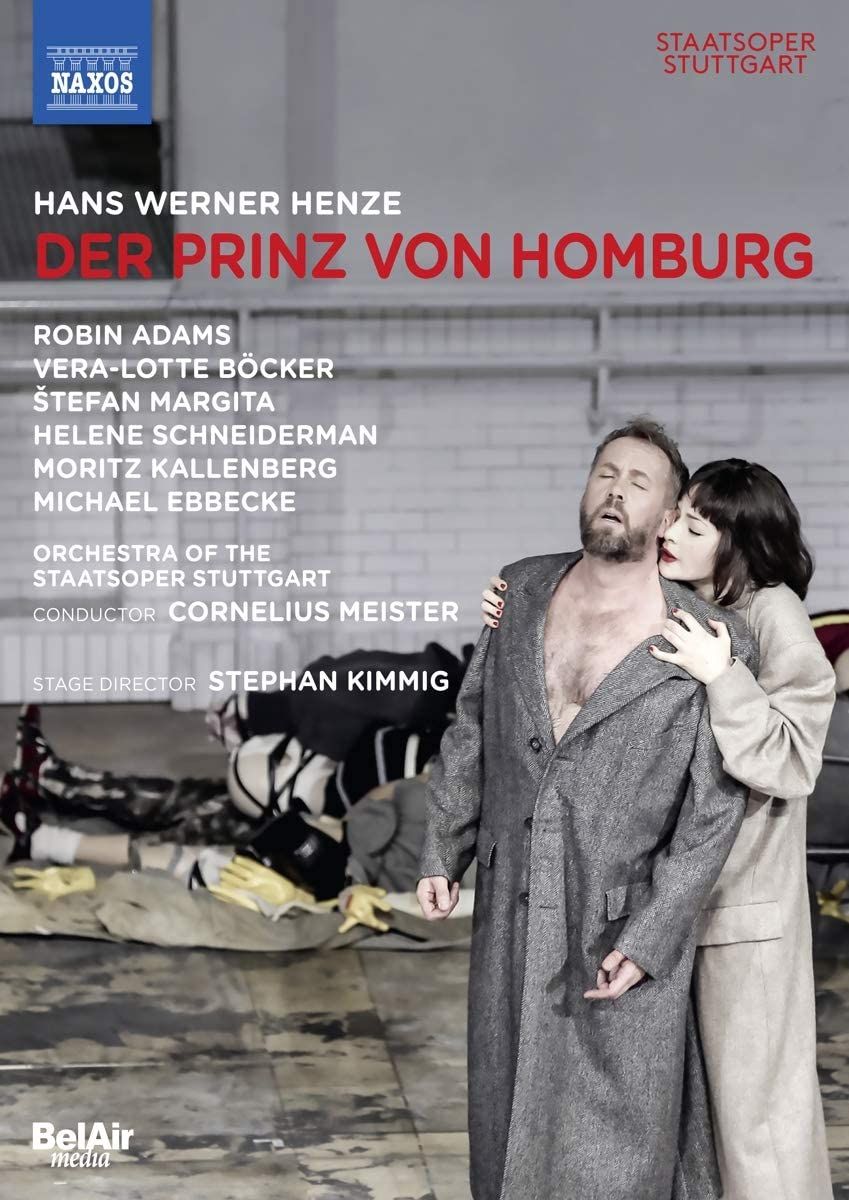HENZE Der Prinz von Homburg (Meister)
View record and artist detailsRecord and Artist Details
Genre:
Opera
Label: Naxos
Magazine Review Date: 11/2020
Media Format: Digital Versatile Disc
Media Runtime:
Mastering:
DDD
Catalogue Number: 2 110668

Tracks:
| Composition | Artist Credit |
|---|---|
| (Der) Prinz von Homburg |
Hans Werner Henze, Composer
Cornelius Meister, Conductor Friedemann Röhlig, Colonel Kottwitz, Bass Helene Schneiderman, The Electress, Mezzo soprano Johannes Kammler, Sergeant, Baritone Michael Ebbecke, Field Marshall Dorfling, Baritone Moritz Kallenberg, Count Hohenzollern, Tenor Robin Adams, Friedrich Artur, Baritone Stefan Margita, Friedrich Wilhelm, Tenor Stuttgart State Opera Chorus Vera-Lotte Böcker, Princess Natalie, Soprano |
Author: Peter Quantrill
Henze was 32 in 1958 when he wrote Der Prinz von Homburg, five years into his self-imposed Italian exile and casting out demons still fresh in the memory: of detested militarism, of a longed-for but warily resisted reconciliation with the fatherland, of the struggle between personal agency and a necessary submission to authority and by extension tradition. These themes would have a lifelong impact on his music but were rarely again distilled with the potency of his response to Heinrich von Kleist’s play of 1810 and its cunning compression by his librettist Ingeborg Bachmann.
The real-life Prince was a successful if impulsive cavalry leader for Frederick the Great but Kleist remodelled him as a dashing and dangerous dreamer, sentenced to death for insubordination. His leader offers him a way out: if he can find it in his heart and head to call his sentence unjust, he will be released. By submitting to the dictates of conscience and coming to terms with the prospect of a just death, he wins respect, pardon and his life – but at what cost?
Bachmann and Henze stripped out or suppressed much of the still-latent nationalism in Kleist’s play, and director Stephan Kimmig follows suit, understandably so: a stage set bristling with Prussian uniforms would likely put off Stuttgart Opera patrons rather more than the dingy tiled white space furnished by Katja Hass’s design (reminiscent of Keith Warner’s Royal Opera settings for both Wozzeck and Mime’s den in Das Rheingold).
Chronologically open-ended between the period of the opera’s composition and the present day, signifying a place for experimentation, exercise and brutality, set and costumes put up the idea of the Elector as a ballet-master (Prussian soldiery apparently used ballet as a military discipline): an apt and playful one for a composer who took pains to assert his place within the canon while tugging away from its conventions. The opera’s dedication to Stravinsky is confident enough to acknowledge in plain sight dramatic debts to the distanced but real emotions of The Rake’s Progress and musical ones to everything from Dumbarton Oaks to Agon.
On film, we see plenty of the excellent orchestra and Cornelius Meister’s incisive direction during the several interludes. The balance between stage and pit comes and goes, but this is a more serious defect of the audio-only production on Capriccio which appears to derive from the same source (minus final applause). Without the benefit of pictures, it would be hard to credit Štefan Margita’s youthful-sounding Heldentenor as the source of the Elector’s authority. Opposite him, the Prince is beautifully pitched by Robin Adams as a Schumann-like character, torn between Florestan and Eusebius, who has wandered in from singing Dichterliebe. His love interest, largely invented by Bachmann, is Princess Natalie, a high lyric soprano part sung with crystalline control by Vera-Lotte Böcker. In her duets with the Prince and the Elector Henze’s inspiration rises highest, and this staging rises with him: like few post-war composers he could write opera for characters who change over the course of a couple of hours, who know themselves better at the end of it, and we are changed a little for knowing them.
Discover the world's largest classical music catalogue with Presto Music.

Gramophone Digital Club
- Digital Edition
- Digital Archive
- Reviews Database
- Full website access
From £8.75 / month
Subscribe
Gramophone Full Club
- Print Edition
- Digital Edition
- Digital Archive
- Reviews Database
- Full website access
From £11.00 / month
Subscribe
If you are a library, university or other organisation that would be interested in an institutional subscription to Gramophone please click here for further information.




